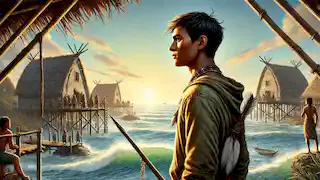Chapter 1: The Call of the Sea
In a time long before the arrival of European settlers, the great waters of the Atlantic Ocean were the domain of the native tribes of the northeastern coast of what is now the United States. Among these tribes was the Wampanoag, a people deeply connected to the sea, its rhythms, and its creatures.
The Wampanoag believed that the sea was a living entity, a being of immense power and wisdom. They called it "Pauomuwaw," the Great Waters. In their stories, the sea was both a provider and a taker, a force of nature to be respected and revered.
Ishmael, a young Wampanoag man, was always fascinated by the sea. He would spend hours listening to the elders' stories about the great creatures that dwelled in its depths. His favorite story was that of Moby Dick, the Great White Whale. This enormous beast was said to be a spirit of the sea, a guardian of the waters, and a test for those who dared to venture into its realm.
One crisp autumn morning, Ishmael stood at the edge of the village, gazing out at the vast expanse of the ocean. The salt air filled his lungs, and the sound of the waves crashing against the shore echoed in his ears. He felt a calling, a deep urge to embark on a journey across the sea. He knew that his destiny lay with the Great White Whale.
"Ishmael, my son," came a voice from behind him. It was his father, a respected warrior and hunter of the tribe. "The sea calls to you, doesn't it?"
Ishmael nodded. "Yes, father. I feel it in my bones. I must go and seek out Moby Dick."
His father placed a hand on his shoulder. "Then go, my son. But remember, the sea is both friend and foe. Respect its power, and it may grant you the strength to face the Great White Whale."
With his father's blessing, Ishmael prepared for his journey. He gathered provisions, tools, and his most trusted weapon, a harpoon made from the bone of a great whale. The village gathered to see him off, their faces a mix of pride and concern.
As Ishmael paddled his canoe out into the open sea, he felt a sense of freedom and excitement. The adventure had begun.
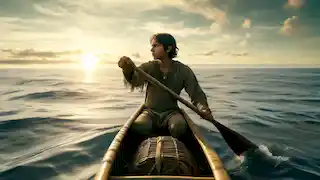
Chapter 2: The Ship and Its Crew
Days turned into weeks as Ishmael navigated the vast ocean. He followed the currents and the stars, trusting in the wisdom passed down through generations. One evening, as the sun dipped below the horizon, he spotted a large ship in the distance. Its sails were billowing in the wind, and it seemed to be heading in his direction.
As the ship drew closer, Ishmael saw that it was a whaling vessel, its deck bustling with activity. He hailed the ship, and soon a rope was lowered to him. He climbed aboard and was met by the captain, a tall, stern-looking man with a weathered face.
"I am Captain Ahab," the man introduced himself. "And who might you be, young man?"
"I am Ishmael of the Wampanoag," he replied. "I seek the Great White Whale, Moby Dick."
Captain Ahab's eyes gleamed with a fierce intensity. "Then we are kindred spirits, Ishmael. I, too, seek Moby Dick. He took my leg years ago, and I have vowed to find him and settle the score."
Ishmael felt a chill run down his spine. He could see the obsession in Ahab's eyes, a burning desire for revenge. Despite his reservations, he decided to join the crew, believing that their shared goal would lead him to the whale he sought.
The ship, named the Pequod, was a floating village of sorts. The crew was a diverse mix of men from different tribes and backgrounds, all united by their pursuit of the great whales. Ishmael quickly befriended Queequeg, a harpooner from a distant island, and Tashtego, a fellow native from the mainland.
As the days turned into weeks, Ishmael learned the ways of the whalers. He marveled at their skills and bravery as they hunted the mighty creatures of the deep. But always, in the back of his mind, was the looming presence of Moby Dick.
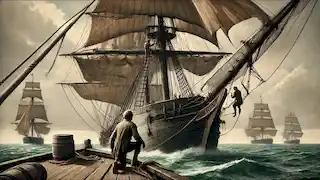
Chapter 3: The Hunt Begins
One morning, as the Pequod sailed through a particularly calm stretch of sea, a lookout spotted a great whale spouting in the distance. The crew sprang into action, preparing their harpoons and lowering the smaller whaleboats into the water. Ishmael and Queequeg joined Captain Ahab in one of the boats, their eyes fixed on the horizon.
As they drew closer, the massive form of the whale became visible. It was not Moby Dick, but it was a formidable beast nonetheless. The crew rowed with all their might, closing the distance. With a mighty heave, Queequeg hurled his harpoon, striking the whale just behind its fin. The creature thrashed in the water, its powerful tail creating waves that rocked the small boats.
Ishmael felt a rush of adrenaline as he watched the struggle. This was what he had come for, the thrill of the hunt and the test of his courage. But even as they brought the whale alongside the ship and began the arduous process of flensing and processing the massive carcass, his thoughts were never far from the Great White Whale.
Days turned into weeks, and the Pequod continued its journey across the vast ocean. They encountered many whales, each hunt bringing them closer to their goal. Captain Ahab grew more intense with each passing day, his obsession with Moby Dick driving him to push the crew harder and harder.
One night, as the ship sailed under a sky full of stars, Ishmael found himself on deck, gazing out at the endless expanse of water. Queequeg joined him, his eyes reflecting the same sense of longing and determination.
"We will find him, brother," Queequeg said, placing a hand on Ishmael's shoulder. "The sea will guide us."
Ishmael nodded, feeling a renewed sense of purpose. He knew that their journey was far from over, but he was ready to face whatever challenges lay ahead.
Chapter 4: The Storm
The sea, ever unpredictable, soon reminded the crew of its power. A massive storm rolled in from the west, its dark clouds and fierce winds threatening to tear the Pequod apart. The crew worked frantically to secure the ship, but the waves were relentless, crashing over the deck and tossing the vessel like a toy.
Ishmael and Queequeg fought to keep their footing as the storm raged around them. Captain Ahab stood at the helm, his face a mask of grim determination. He seemed unfazed by the fury of the elements, his focus unwavering.
For hours, the storm battered the Pequod, but the ship held strong. As dawn broke, the winds began to die down, and the sea slowly returned to a state of calm. The crew, exhausted but relieved, set about repairing the damage.
As they worked, a lookout shouted from the crow's nest. "Whale spouting off the port bow!"
All eyes turned to the horizon, where a massive shape was breaking the surface of the water. It was Moby Dick, the Great White Whale. The sight of the legendary creature filled the crew with a mix of awe and fear.
Captain Ahab's face lit up with a fierce joy. "Prepare the boats!" he commanded. "This is our moment!"
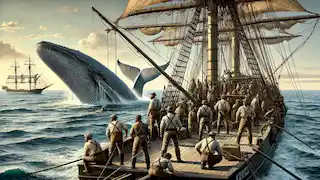
Chapter 5: The Final Confrontation
The whaleboats were quickly lowered into the water, and the crew rowed with all their might toward the great beast. Ishmael felt his heart pounding in his chest as they closed the distance. Moby Dick was even more magnificent than he had imagined, a true giant of the sea.
As they approached, the whale seemed to sense their presence. With a flick of its massive tail, it dove beneath the surface, disappearing into the depths. The crew waited, tense and ready, their harpoons at the ready.
Suddenly, the whale breached the surface, its enormous body rising out of the water. Captain Ahab raised his harpoon, his eyes locked on the beast. With a mighty throw, he hurled the weapon, striking Moby Dick just behind its eye.
The whale let out a deafening roar, its body thrashing in the water. The force of its movements sent waves crashing over the boats, nearly capsizing them. Ishmael and Queequeg held on for dear life, their eyes fixed on the battle unfolding before them.
Captain Ahab, consumed by his obsession, urged the crew on. "Hold fast! We have him now!"
But Moby Dick was not so easily defeated. With a powerful flick of its tail, it struck Ahab's boat, shattering it into pieces. The captain and his men were thrown into the water, their cries lost in the chaos.
Ishmael and Queequeg watched in horror as the Great White Whale turned its attention toward the Pequod. With a mighty lunge, it struck the ship, its massive head smashing through the hull. The crew scrambled to escape as the vessel began to sink.
In the midst of the chaos, Ishmael found himself clinging to a piece of debris, the sea swirling around him. He watched as Moby Dick, victorious, disappeared beneath the waves. The battle was over, and the Great White Whale had won.
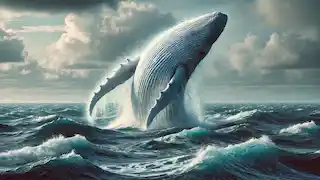
Chapter 6: The Aftermath
The sun rose over the horizon, casting a golden light over the wreck
age of the Pequod. Ishmael floated on the open sea, the debris of the ship scattered around him. He was the sole survivor, left to ponder the events that had transpired.
As the hours passed, a small whaling ship appeared on the horizon. The crew spotted Ishmael and quickly pulled him aboard. Weak and exhausted, he recounted the tale of the Great White Whale and the fate of the Pequod.
The sailors listened in awe and disbelief, but they could see the truth in Ishmael's eyes. He had faced Moby Dick and lived to tell the tale. They tended to his wounds and provided him with food and water, their ship turning back toward the nearest port.
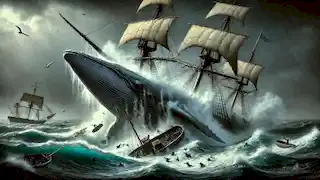
Chapter 7: The Return
Upon his return to land, Ishmael found himself changed by the experience. The sea had taken much from him, but it had also given him a new understanding of its power and mystery. He returned to his village, where his people welcomed him back with open arms.
The elders listened to his story with great interest, seeing in his journey the fulfillment of an ancient prophecy. Ishmael's encounter with Moby Dick became a part of the tribe's oral history, a tale to be told for generations to come.
In the years that followed, Ishmael continued to honor the sea, sharing his knowledge and experiences with the younger members of his tribe. He taught them the importance of respecting the great waters and the creatures that dwelled within.
And so, the legend of Moby Dick lived on, not just as a story of revenge and obsession, but as a reminder of the delicate balance between man and nature. Ishmael's journey had shown that while the sea could be a fierce and unforgiving force, it was also a source of life, wisdom, and wonder.
Epilogue: The Legacy
Many moons passed, and Ishmael grew old, his hair turning as white as the great whale he had once pursued. He would often sit by the shore, watching the waves and remembering the friends and comrades he had lost. The sea was his home, his teacher, and his greatest challenge.
One day, as he gazed out at the horizon, he saw a group of young Wampanoag men preparing their canoes for a journey. They were eager, filled with the same sense of adventure and curiosity that had once driven him. Ishmael approached them, offering words of wisdom and encouragement.
"Remember," he told them, "the sea is both friend and foe. Respect its power, and it may grant you the strength to face whatever challenges come your way."
The young men nodded, their eyes shining with determination. They paddled out into the open water, their canoes cutting through the waves with grace and purpose. Ishmael watched them go, feeling a sense of pride and hope for the future.
As the sun set over the Atlantic, casting its golden light over the water, Ishmael knew that the spirit of the Great White Whale lived on. Moby Dick was not just a creature of legend, but a symbol of the enduring bond between man and the sea.
And so, the story of Ishmael and Moby Dick became a cherished part of Wampanoag heritage, a testament to the bravery, resilience, and wisdom of their people. The tale was passed down from generation to generation, a reminder of the timeless dance between humanity and the great waters.

